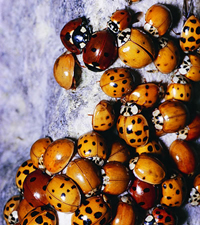There are many ways to keep Asian lady beetles from being a house guest
By Chelsea Carter
Ag Communications
October 26, 2006
 |
| Photo by: Steve Marshall, University of Guelph |
WEST LAFAYETTE, Ind. - A Purdue University expert says there are several ways to protect homes from being infested with Asian lady beetles.
"It's been a problem for the last three or four years," said Tim Gibb, Purdue Extension entomologist. "They were first intentionally brought into the U.S. to control aphid pests in fruit trees near the East Coast."
According to research, the lady beetles were effective, and aphid populations have been suppressed. Homeowners, however, receive no benefit when their homes are invaded during the fall and winter months.
"This is the time of year we get the most complaints and questions about dealing with these insects," Gibb said.
A Purdue expert suggests several methods to control the pests.
When the number of insects is small, one method is to physically remove the beetles from the home. This could be done through regularly sweeping or vacuuming the affected areas, Gibb said.
For higher populations of insects, chemicals could be used to control them. Applying pesticides during the late fall months around the perimeter of the home will help prevent the infestation of these beetles. According to Gibb, the most effective pesticides include Demand, Suspend, Talstar, Tempo or Demon.
The most effective control measure is to prevent the beetles from entering the home altogether. According to Gibb, caulking cracks around utility service openings, fixing broken window screens and door jambs and plugging openings in the foundation or roof are activities that decrease the opportunity for the beetles to become uninvited guests.
To find out more about the Asian lady beetle, call (888) EXT-INFO or contact Gibb at (765) 494-4570 or by e-mail at gibbs@purdue.edu.
Writer: Chelsea Carter, 765/494-8402, carterc@purdue.edu
Source: Tim Gibb, 765/494-4570, gibbs@purdue.edu
Ag Communications: (765) 494-2722;
Beth Forbes, forbes@purdue.edu
Agriculture News Page
|